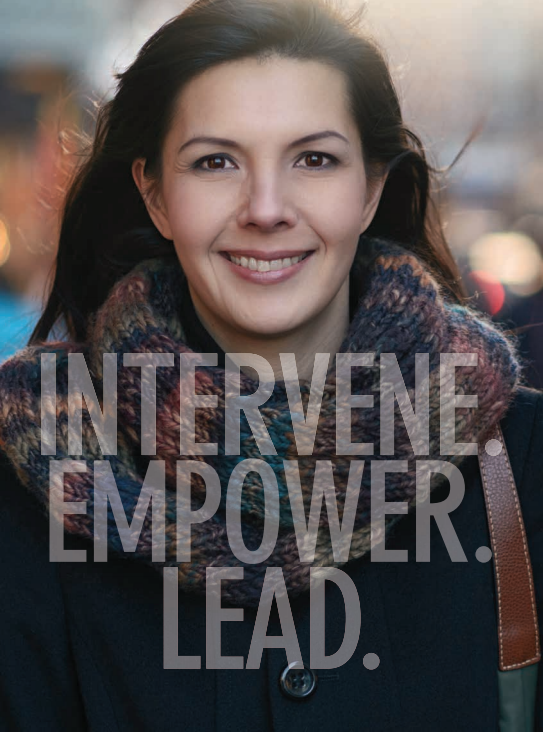The YWCA is the largest and longest serving women’s organization in Calgary. We offer programs that create a continuum of service for women, and their families who are struggling with poverty, homelessness, domestic abuse and isolation. Through our 105 year history, we recognize the need to change and modify our programs to the ever evolving needs of women in our community. Our focus is on empowering women to move from a place of vulnerability to one of resilience, and we continue to be there when and where she needs us most. To ensure we know and understand who we support, why we are here and how we approach our work, in early 2016 we released our Practice Framework.
Our Practice Framework is a document that outlines our philosophy of the way that we work with women. The framework is not just a piece of paper; it is a commitment to what we do and how we do it. We approach our work from a woman’s point of view with an understanding of oppression, inequity and constrained choice that women experience. We work to build up women, community and culture. Moving forward, our aim is to promote evidence-based best practice with a unified approach from frontline client service to support services and advocacy.
Our goal is to ensure that all women who are experiencing abuse, poverty, social isolation and/or homelessness have access to our services. To that end, we strive to offer anti-oppressive, low barrier, inclusive service that is reflective of what women share in common as well as their differences. Our approach to all service is woman-centered and takes a feminist, intersectional and anti-oppressive approach.
The focus of our service delivery is based on three areas: rigour in service delivery, depth in service delivery and excellence in service delivery. We want to ensure our work has a clear vision and focus; we intend to develop our expertise and we are known for our continuum of service delivery that supports a woman’s mind, body and spirit. With our focus clear and articulated our framework developed from conversations with frontline staff, leadership and external stakeholders. The foundations of our approach are based on seven guiding principles:
- Safety first
- Violence-informed and trauma sensitive
- Women-centered and feminist-based
- Intersectional and anti-oppressive approaches
- Inclusive, low-barrier services
- Harm reduction
- Support for women as mothers: linking the safety and well-being of women and their children
Safety is a fundamental tenet of women’s support services and is at the centre of all of our decisions. Our responsibility is to ensure that women and their families feel safe, physically and emotionally while receiving services at the YWCA.
A violence-informed and trauma sensitive approach means that we broadly implement violence-informed and trauma sensitive policies and practices that create a safe environment, respectful and caring relationships and to avoid re-traumatizing women.
Women-centered and feminist-based frameworks acknowledge that women have different lived experiences than men and require services that focus on equality and equity goals.
At the YWCA, intersectional and anti-oppressive approaches mean women will have the opportunity to explore how their various social identities and experiences intersect and impact their experiences of violence, access to services, the kind of support they receive and how relevant and meaningful the support is. This can counter women’s experiences of oppression and vulnerability.
Inclusive, low-barrier services approach recognizes how difficult it is for all women to access support, and some women face additional systemic barriers. Our practice must reflect a commitment to reducing systemic barriers.
Harm reduction is a specific approach that aims to keep people safe and minimize the serious and often life-threatening consequences of a variety of high-risk behaviours, particularly substance use. At the YWCA, harm reduction involves a broad range of support services and strategies to enhance women’s knowledge, skills, resources, and supports.
Support for women as mothers means that women living in poverty or isolation or living with an abusive partner can undermine women’s ability to mother their children the way they wish to. We will support the mother and child bond and avoid any interventions that diminish women’s capacity to parent.
We are stating our belief in an approach that recognizes the unique factors that are a part of women’s experiences of violence, oppression and homelessness. We will not repeat these dynamics in our relationships with women we support.
Specific to the Housing and Supports programs, the framework has driven a shift in many of our approaches that have increased our staff capacity in role specialization and outreach. Our low-barrier services are currently working with women who identify as the highest vulnerability across Calgary who are now being supported to find housing. We believe that building a trusting relationship with women is key to providing safety, and this is where we see our success.
This blog post is part of our series which highlights sessions of the 2016 National Conference on Ending Homelessness. Hear Ashley Jellema speak on Thursday, November 3rd at 3:30PM on the topic of reducing homelessness for women through trauma‐informed inclusive services. Learn more about this upcoming conference presented by CAEH at: http://conference.caeh.ca/.


